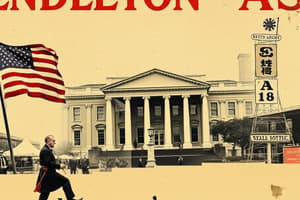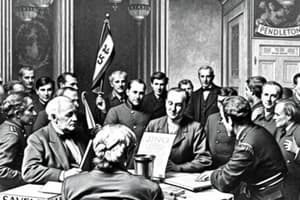Podcast
Questions and Answers
What year was the Pendleton Act enacted?
What year was the Pendleton Act enacted?
- 1883 (correct)
- 1907
- 1940
- 1905
Which act prohibited corporations from making direct financial contributions to federal candidates?
Which act prohibited corporations from making direct financial contributions to federal candidates?
- Taft-Hartley Act
- Tillman Act (correct)
- Pendleton Act
- Hatch Amendments
What was Teddy Roosevelt's proposal regarding contributions from corporations?
What was Teddy Roosevelt's proposal regarding contributions from corporations?
All contributions by corporations to any political committee or for any political purpose should be forbidden by law.
What did the Hatch Amendments in 1940 set?
What did the Hatch Amendments in 1940 set?
The Smith-Connally Act of 1943 extended the prohibition on contributions to federal candidates to include unions.
The Smith-Connally Act of 1943 extended the prohibition on contributions to federal candidates to include unions.
What significant change did the Federal Election Campaign Act (FECA) bring about?
What significant change did the Federal Election Campaign Act (FECA) bring about?
What key feature was introduced in the Revenue Act of 1971?
What key feature was introduced in the Revenue Act of 1971?
What was a significant outcome of the FECA Amendments post-Watergate?
What was a significant outcome of the FECA Amendments post-Watergate?
The first Political Action Committee (PAC) was formed in 1944.
The first Political Action Committee (PAC) was formed in 1944.
Flashcards are hidden until you start studying
Study Notes
Pendleton Act
- Enacted in 1883 as a civil service reform measure.
- Prohibited federal candidates from compelling employees to support their campaigns or donate money.
- Extended this prohibition to all federal civil service workers.
- Reversed a tradition where government workers were coerced into making contributions to retain their positions.
Teddy Roosevelt's Message to Congress
- In 1905, President Theodore Roosevelt urged the prohibition of corporate contributions to political committees.
- The proposal did not restrict contributions from individuals running corporations.
- Roosevelt advocated for public financing of federal candidates through their political parties.
Tillman Act
- Established in 1907, it barred corporations and nationally chartered banks from making direct financial contributions to federal candidates.
- Faced challenges with weak enforcement that limited effectiveness.
Hatch Amendments
- Introduced in 1940, these amendments set an annual limit of $5,000 on individual contributions to federal candidates or political committees.
- Did not prevent contributors from giving to multiple committees supporting the same candidate.
- Made campaign finance regulations applicable to both primaries and general elections.
- Banned contributions from federal employees and businesses to candidates.
Smith Connally Act
- Enacted in 1943 to extend the contribution prohibition to labor unions, following increased funding from union dues to federal candidates.
Formations of First PAC
- In 1944, the first Political Action Committee (PAC) was created by the Congress of Industrial Organizations (CIO).
- Aimed to raise funds for the re-election of President Franklin D. Roosevelt.
- Funded through voluntary contributions from union members, sidestepping Smith-Connally Act restrictions.
Taft-Hartley Act
- Passed in 1947, it solidified the ban on contributions from unions, corporations, and interstate banks to federal candidates.
- Extended the prohibition to primary elections.
House Campaign Finance Reports Collected for First Time
- In 1967, former Congressman W. Pat Jennings began collecting campaign finance reports as mandated by the 1925 Corrupt Practices Act.
- The Justice Department largely ignored his report of violators.
Federal Election Campaign Act (FECA)
- Repealed the Corrupt Practices Act and established a regulatory framework for federal campaign financing.
- Required complete and timely financial disclosures.
- Set limits on media advertising and allowed unions and corporations to solicit voluntary contributions.
Revenue Act
- Introduced in 1971 as a companion to FECA.
- Created a public campaign fund for presidential candidates, starting with the 1976 election.
- Enabled a voluntary one-dollar check-off on federal income tax returns and a tax deduction for contributions.
FECA Amendments (Post Watergate)
- Enacted in 1974, these amendments created significant legislative changes and controversies.
- Offered full public financing for presidential general elections and matching funds for presidential primaries.
- Introduced spending limits for various races and contribution limits for individuals ($1,000) and PACs ($5,000).
- Set an aggregate individual contribution ceiling of $25,000 annually.
- Created the Federal Election Commission (FEC) to oversee campaign finance law implementation.
Studying That Suits You
Use AI to generate personalized quizzes and flashcards to suit your learning preferences.




